- Home
- Nancy Means Wright
The Pea Soup Poisonings
The Pea Soup Poisonings Read online
THE PEA SOUP POISONINGS
Recipient of an Agatha Award
for Best Children’s/YA Novel
Nancy Means Wright
Chapter One
The Northern Spies
The Northern Spy Club was waiting in the barn when Zoe Elwood entered. Five boys sat there in the hay, their pockets bulging with green apples. Their tin badges gleamed in the July sun that slanted through the loft window. The old barn was thick with dust and mold and the ripe smell of apples. Zoe sneezed and heard the boys snicker. Planting her feet wide, she stared up at the rafters, and at the wood beam that spanned the width of the barn overhead. It overhung a mound of hay, her father’s broken tractor, and a couple of jagged saws. The sun rays bounced off the half-rusted steel like knives.
She heard the whispers in the hay. They echoed through the gloom. “She can’t do it. A sissy girl?”
“I can,” she said, the words thick in her throat. “I can walk that beam.”
You had to do two things to get into the Northern Spy Club. You had to walk the beam and you had to solve a crime. Her brother Kelby had made those rules. He had named the club Northern Spy because its headquarters were in the hut under a Northern Spy apple tree, one of a hundred trees in their father’s apple orchard. When Kelby declared himself Chief Detective right after the close of school, the neighborhood boys had rushed to join up. They had all walked the beam (they said), and now they were busy solving a crime.
It was the Bagley sisters’ pea soup that had poisoned Tiny Alice Fairweather’s grandmother, Kelby said; the police had found a trace of a poison in it, and the Spy Club was out to prove that the old ladies had done it. Zoe liked the Bagley sisters. She was sure someone else had put the poison in that soup. She wanted to prove the sisters innocent.
But to prove them innocent she would have to find the real culprit. How was she going to do that?
Well, tomorrow she’d go investigate the scene of the “poisoning”: the Bagley sisters’ kitchen. But before she could solve the crime, she had to walk the beam.
“I can, too, do it,” she whispered, and started toward the rickety ladder that led up to the beam.
The rungs were thin and worn. She glanced up as she climbed. The beam looked frail, as if it were attached to the wall by nothing but cobwebs.
The ladder jiggled under the weight of her body. She could fall and kill herself before she even reached the beam! She imagined the funeral: her mother sobbing into a tissue, her father’s face red and sorrowful. Her nose filled at the thought, and for a moment she couldn’t see.
A few feet from the top she felt herself swaying. A tiger kitten rubbed against the foot of the ladder. A swallow swooped low overhead. She gasped. If it struck the ladder she’d go down. And that would be the end. She’d be in a black hole somewhere, like Tiny Alice’s grandmother.
Somewhere far below she heard them teasing her.
“Uh oh-baby Zo-eeeee...”
She took a stabbing breath and went the last two rungs to the top. She wrapped her arms around the splintery beam. She heaved herself up, the way she did on the jungle gym at school – until she was standing, her face to the side of the barn. A wave of nausea flushed through her body.
When she managed to twist herself around, she saw how narrow the beam was. It was wide enough for only one foot at a time, and her left foot was in front of the right. She cursed those long feet she’d inherited from her grandmother Elwood. Slowly she found her balance, staring down at her shoes to keep from looking into the void. It was a long way across, maybe thirty feet. She remembered the saws lying in wait below, their rusty points aimed at her heart.
“Oh woe – there goes Zo-eeeee,” the Spies chanted.
Biting her lip she took a blind step out onto the beam. The third step out her left foot landed on top of her right. She lifted it up and balanced there on one foot; the other crooked out like a dancer.
“She’s gonna fall!” the Spies cried out below.
Her left leg scissored in the air. Then it dropped down on the beam to rest, trembling, just ahead of the right.
The beam was rougher toward the middle, full of bumps and hollows that caught her sneakered toes. Pulling out a caught foot, she looked down and was giddy. She wasn’t yet halfway.
She couldn’t do it.
“I can,” she told herself. “I can.”
She inched onward. The beam was smoother now, she moved faster. Her heart beat everywhere: in her head, her knees, her feet. She was almost a third of the way. She glanced ahead. The end was a blaze of sun; her eyes were full of it. She couldn’t see her feet. She couldn’t see the beam! The air was filled with shouts. She had to go forward. She took a step – and met air.
There was a sharp pain in her thigh where she’d fallen onto the beam. The next she knew she was upside down, arms and legs cradling the beam like a monkey. The beam seemed to gallop away with her. Her chest was cramped, she could hardly breathe.
She had to get up again, up!
But she wasn’t monkey enough. Something grabbed her; she felt herself being lifted away, onto a ladder. A voice boomed in her ear, her father’s voice. She saw his brown hair standing on end as he bore her downward. He was shouting. She heard the others arguing, Kelby’s voice shrilling above the rest.
“It was not dangerous,” Kelby shouted. “You know you like the Spies, Dad. It was nothing. We all did it. She’s a baby, that’s all. You’ll never make the Spy Club, baby! You’ll never solve a crime.”
“I’m not. I will. I can do it. Let me back up!”
But the arms pulled her relentlessly down.
Chapter Two
Zoe Makes a Promise
Supper at Zoe’s house was quiet. Her mother, who was teaching summer school, brought out a zucchini quiche, then ran upstairs to prepare Monday’s class. Her brother Kelby was shut in his room – to repent, his father said. “To think up new ways of annoying her,” Zoe told her friend, Spence, who had invited himself over. Spence didn’t belong to the Spy Club either. His father, a guitarist who liked music better than spies, wouldn’t let him join.
“I can walk the beam,” she whispered to Spence. “I will. You’ll see. And I’ll find that poisoner.”
Spence looked at her, wide-eyed, humming in his throat. “I don’t want to see,” he whispered. “And what’s this about finding a poisoner?”
“It’s Tiny Alice’s grandmother. She was poisoned, and the police think the Bagley sisters did it.”
“What? Those old crazies?” Spence whistled, and sank down cross-legged on the floor.
“You know how they send around soup to all the old people in town? Well, the police found an insecticide in it.”
“They found a what?”
“Insecticide. They spray it on apple trees to kill the maggots and bagworms. Anyway, Kelby went to spy on the sisters once and says they were having an argument with Alice’s granny. He says Miss Maud told the grandmother she could ‘kill her’ for saying what she said. He’s going to tell the police!”
Spence whistled again; his thatch of carroty hair fell in front of his eyes.
“Well, don’t just sit there and whistle. We have to talk to the Bagley sisters. We have to hear their side of the story. Miss Maud was my second grade teacher. We have to find out who the real killer is.”
“Suppose we find it really was the Bagley sisters?”
“Then Kelby wins. And I don’t get to join the Northern Spy Club.”
“So?” Spence said, and stuck a wad of Juicy Fruit gum in his cheek. “Why do you have to join that bunch of show-offs, anyway?”
Zoe accepted the stick of gum Spence offered, and chewed thoughtfully for a minute. She tugged at her brown
ponytail. Finally she said, “I have to, that’s all. I just plain have to.” Sucking in her lip she glanced at Spence, and then up at the ceiling - she’d heard a thumping sound. Kelby’s room was directly overhead; there was a hole where the stovepipe went through. She knew that Kelby was crouched there on the floor, listening.
“I can do it,” she said loudly.
A voice came back, sounding hollow and mysterious and not like Kelby’s voice at all.
“Five days. Starting at midnight, you have five days to disprove the Bagleys killed Alice’s granny. Or else the sisters are going to prison!”
“I’ll do it, I promise you that,” she said, shivering, her chin lifted to the stovepipe hole. “You’ll see. I’ll do it.”
“Tomorrow at nine,” she whispered to Spence. “We meet at the Bagley sisters’ back door. Bring your tape recorder.”
“Okay. But I won’t eat any of their pea soup,” Spence said. “Don’t ask me to do that!”
He yelped when Zoe stuck an elbow in his ribs.
Chapter Three
Collecting Evidence
“Got the tape recorder?” Zoe asked when Spence came running up to the Bagley sisters’ gate, out of breath and peeling back a banana. He was wearing a T-shirt that read BANDS NOT BOMBS.
“Oops,” said Spence, “I forgot.”
“Run back and get it, then. You don’t get paid till you have it.”
“I get paid for doing this?”
“Yup.” Zoe held out a fistful of chocolate-covered peanuts. “One for every fifteen minutes you work for me.”
“I’m working for you?”
“Of course. I’m the head detective and you’re in my employ. Now hurry up and get that tape recorder.”
“Jeezum,” Spence said, “you’re as bad as your brother,” and he dashed off across the road.
“Oh, no, I’m not,” she hollered. “I’m not as bad as Kelby. You take that back, Spence Riley!”
But he had already slammed through his front door.
Sighing, Zoe walked around to the Bagley’s kitchen door and peeked in through the screen. It was a warm July morning and the sisters were sitting at the breakfast table. Miss Maud wore a purple sundress that fell raggedly to her ankles and Miss Gertie wore saggy dungarees and a blue cotton shirt. Gertie was the younger of the two, although she looked as ancient as her sister with her white hair falling out of its pins and straggling halfway down her back.
The two were drinking their morning Raspberry Zinger tea out of flowered cups. Already a huge iron pot of something smelly was steaming away on the stove. Bunches of dried plants hung from the beams overhead - they were actually poison hemlock and bloodroot, Kelby said, but Zoe didn’t believe it.
“Well, come in, child,” Miss Maud said, “Don’t just stand there. Your nose is poking a hole through that screen.”
The screen was already full of holes, but Zoe smiled anyway, and walked in. The sisters seemed happy to see her; they dragged over a chair and Miss Gertie plunked down a glass of milk and a sugary doughnut at her place.
“You know why I’m here,” Zoe said, getting right to the point.
“Do we?” said the sisters.
“It’s about the pea soup poisoning,” she explained. She stuck a thumb in the direction of Tiny Alice’s house.
“Oh, dear,” said the sisters, and glanced at each other. Then they both started talking at once. Zoe heard the words “police” and “our pea soup?” And “How can they possibly think that we...” Then Spence arrived and the sisters turned on him. “We didn’t do it!” they cried.
“Uh huh,” Spence murmured, and when Zoe made a face at him, “I mean, no, no, of course not,” he said, and the sisters sat him down with a glass of milk and a doughnut.
“We know you didn’t poison Alice’s granny and we want to prove it. So we need to ask some questions,” Zoe said. “But we have to warn you that you’re being recorded.” She pointed at the tape recorder Spence was pulling out of his pocket.
“Oh,” said the sisters, looking thrilled at the idea of being recorded. “How things change,” said Miss Maud. “I used to ask all the questions in class and now you’re asking me!”
“Okay then,” said Zoe. “What did you put in the pea soup you took over to the Fairweathers’ house ten days ago?”
Maud looked at her sister. “You made that batch, I think, Gertie.”
“Oh, no,” said Gertie, “you did, Maud. Oh absolutely. I was making lentil soup that day. For the Meals On Wheels. It was your pea soup you were taking around the neighborhood.”
Maud thought a minute. “Oh, maybe so. Well, I just put in the usual. Split peas, onion, a little ham, a few spices.”
“What spices exactly?” said Zoe, frowning at Spence who was wolfing down a second doughnut.
“Let’s see, now. We-ell, a bay leaf, garlic, red wine vinegar, a pinch of dry mustard…’
“I never put in dry mustard,” Gertie argued.
“Well I do. It gives it a certain je ne sais quoi. Agnes Fairweather loves the mustard.”
“Past tense,” said Miss Gertie. “Agnes is dead now.”
“Oh, yes, oh dear. And a garnish of fresh parsley,” Maud finished. “Then I put some here in the freezer and ran a potful over to Agnes.”
“You took it to her yourself then? Let’s see. It was a Thursday afternoon, I believe,” said Zoe, putting a restraining hand over Spence’s as he reached for a third doughnut.
“Oh, yes,” said Miss Maud. “I mean, I left it on her kitchen table. She was upstairs resting, young Alice said. And Alice’s mother – ”
“Madeline,” said Zoe.
“Madeline, yes. Though I don’t hold with children calling their mothers by their first names. Anyway, Madeline was there, too, making a meatloaf, as I recall. She said she’d serve the soup as soon as the grandmother came downstairs. Agnes had been poorly for the last month, but before that she was in good health, which is what I don’t understand. I mean how she could up and die? Just like that?” She snapped her fingers.
“Would you repeat that, please?” said Spence, who was taking notes as well as recording the conversation.
“Never mind,” said Zoe. “It’s on the tape. So, Alice and her mother were the only ones there when you came?”
Miss Maud squinted thoughtfully at the ceiling. “Well, Thelma was there, she’d been working in the garden, as I recall. She had a spade in her hand.”
“Maybe she put the poison in the soup,” Spence suggested.
“Oh, but she’s Agnes’s sister!” cried Miss Gertie. “Would Thelma poison her own sister? Not on purpose, anyhow.”
“I wouldn’t think so, oh, no, no. Thelma’s a little spacey, but she’s a good person,” said Miss Maud.
“Mmm,” said Zoe. “Well, that’s all the questions for now, thank you.” She tapped Spence on the shoulder. Reluctantly he got up, still gazing at the doughnuts.
“Now, if my brother Kelby comes over, don’t tell him anything, please?” Zoe begged. “You remember those tricks he used to play in school?”
“Oh, yes,” murmured Miss Maud. “The time he set off alarm clocks every fifteen minutes and they set me back a whole day?”
“You’ve got it,” said Zoe. “And one more thing.”
“Yes?” The sisters looked at her expectantly.
“Could I have a sample of your pea soup? You said you put some of it in the freezer?”
“Of course, dear,” said Miss Maud, and hustled over to the refrigerator, the white topknot wiggling on her head. “Maybe your mother would like some, too.”
Spence groaned, and Zoe narrowed her eyes at him. “She’d love it. But just enough for a bowlful, please.”
“But it’s frozen, dear, take it all. You can eat it. A family of four?”
Zoe thanked the sisters and pushed Spence out the door ahead of her.
“You’re not really going to eat that,” he said. “I hear they make it in a chamber pot!”
“Of
course, I am. To prove it’s all right.”
“I’ll come to your funeral.”
“You won’t have to. So let’s go to my house. We’ll listen to that tape again.”
“What for? They didn’t say anything much.”
“It isn’t what they said, it’s what they didn’t say. You have to listen between the lines.”
“What lines?” said Spence. “Speak English, please. Anyway, if you want to know exactly what was going on in Alice’s kitchen that day, why don’t you ask Alice?”
“Exactly my thoughts,” said Zoe, handing over a couple of chocolate peanuts. “We’ll phone her when we get to my house.” Zoe was angling fo a cell phone for her birthday, but her parents said not till she turned thirteen.
As it turned out, she didn’t have to phone Alice because just as they were entering the house with the frozen soup, her father called to her that Alice was on the line.
“Zoe,” cried Alice, her voice all breathless and quivery, “something terrible’s going on. Next door at Aunt Thelma’s. I need you. Come quick!”
And the line went dead.
Chapter Four
Help! Kidnappers!
Tiny Alice was outside staring over at her Aunt Thelma’s house where a car painted two shades of blue was idling in the driveway. Alice’s face was red with tears; her long chestnut hair was whipping about in the wind. “They’re taking Auntie away!” she cried when she saw Zoe. “And she doesn’t want to go-oo...”
It was true, Zoe saw. Alice’s great-aunt Thelma was being hustled into the car between a man and a woman. The man was big and beefy, he seemed almost seven feet tall. Thelma’s chocolate-brown eyes looked pleadingly at Zoe. Help me, the eyes said.
“Get the license number,” Zoe told Spence, and she dashed across the lawn.
“Leave her alone!” Zoe yelled, and yanked at the man’s arm. He brushed her off as if she were a fat black fly.

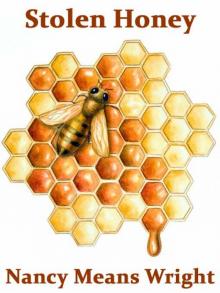 Stolen Honey
Stolen Honey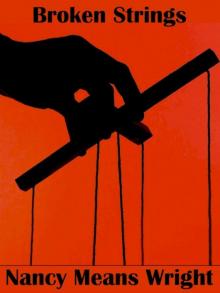 Broken Strings
Broken Strings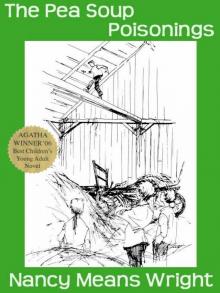 The Pea Soup Poisonings
The Pea Soup Poisonings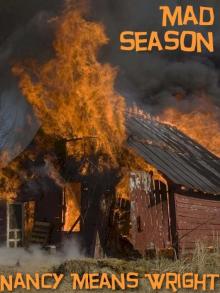 Mad Season
Mad Season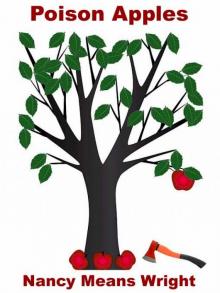 Poison Apples
Poison Apples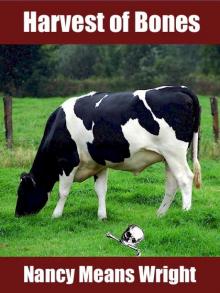 Harvest of Bones
Harvest of Bones